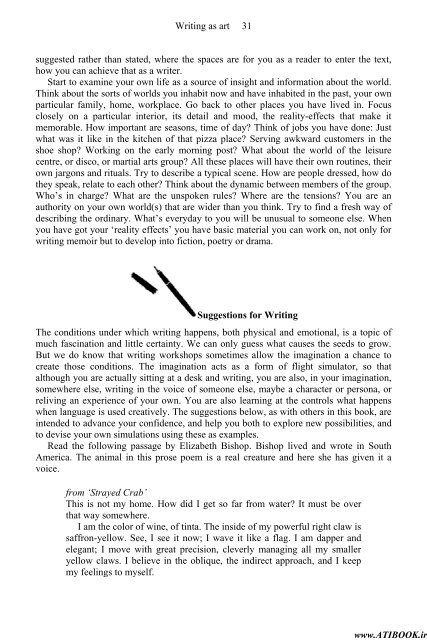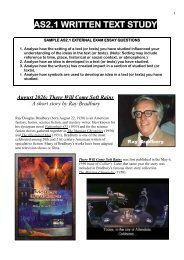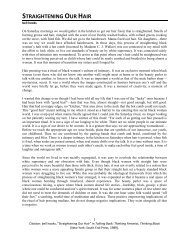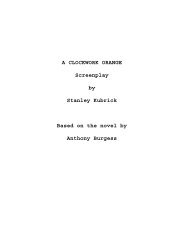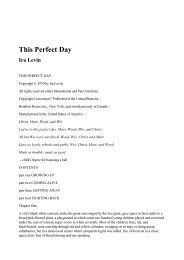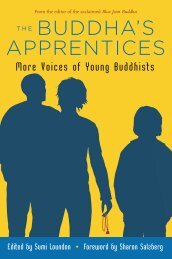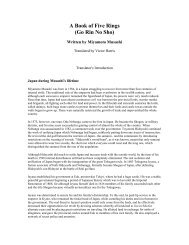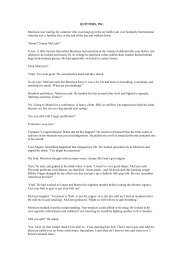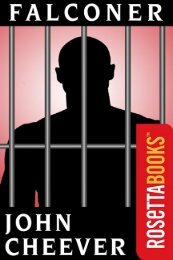9780415317856_the_routledge_creative_writing_coursebook
9780415317856_the_routledge_creative_writing_coursebook
9780415317856_the_routledge_creative_writing_coursebook
Create successful ePaper yourself
Turn your PDF publications into a flip-book with our unique Google optimized e-Paper software.
www.ATIBOOK.irWriting as art 31suggested ra<strong>the</strong>r than stated, where <strong>the</strong> spaces are for you as a reader to enter <strong>the</strong> text,how you can achieve that as a writer.Start to examine your own life as a source of insight and information about <strong>the</strong> world.Think about <strong>the</strong> sorts of worlds you inhabit now and have inhabited in <strong>the</strong> past, your ownparticular family, home, workplace. Go back to o<strong>the</strong>r places you have lived in. Focusclosely on a particular interior, its detail and mood, <strong>the</strong> reality-effects that make itmemorable. How important are seasons, time of day? Think of jobs you have done: Justwhat was it like in <strong>the</strong> kitchen of that pizza place? Serving awkward customers in <strong>the</strong>shoe shop? Working on <strong>the</strong> early morning post? What about <strong>the</strong> world of <strong>the</strong> leisurecentre, or disco, or martial arts group? All <strong>the</strong>se places will have <strong>the</strong>ir own routines, <strong>the</strong>irown jargons and rituals. Try to describe a typical scene. How are people dressed, how do<strong>the</strong>y speak, relate to each o<strong>the</strong>r? Think about <strong>the</strong> dynamic between members of <strong>the</strong> group.Who’s in charge? What are <strong>the</strong> unspoken rules? Where are <strong>the</strong> tensions? You are anauthority on your own world(s) that are wider than you think. Try to find a fresh way ofdescribing <strong>the</strong> ordinary. What’s everyday to you will be unusual to someone else. Whenyou have got your ‘reality effects’ you have basic material you can work on, not only for<strong>writing</strong> memoir but to develop into fiction, poetry or drama.Suggestions for WritingThe conditions under which <strong>writing</strong> happens, both physical and emotional, is a topic ofmuch fascination and little certainty. We can only guess what causes <strong>the</strong> seeds to grow.But we do know that <strong>writing</strong> workshops sometimes allow <strong>the</strong> imagination a chance tocreate those conditions. The imagination acts as a form of flight simulator, so thatalthough you are actually sitting at a desk and <strong>writing</strong>, you are also, in your imagination,somewhere else, <strong>writing</strong> in <strong>the</strong> voice of someone else, maybe a character or persona, orreliving an experience of your own. You are also learning at <strong>the</strong> controls what happenswhen language is used <strong>creative</strong>ly. The suggestions below, as with o<strong>the</strong>rs in this book, areintended to advance your confidence, and help you both to explore new possibilities, andto devise your own simulations using <strong>the</strong>se as examples.Read <strong>the</strong> following passage by Elizabeth Bishop. Bishop lived and wrote in SouthAmerica. The animal in this prose poem is a real creature and here she has given it avoice.from ‘Strayed Crab’This is not my home. How did I get so far from water? It must be overthat way somewhere.I am <strong>the</strong> color of wine, of tinta. The inside of my powerful right claw issaffron-yellow. See, I see it now; I wave it like a flag. I am dapper andelegant; I move with great precision, cleverly managing all my smalleryellow claws. I believe in <strong>the</strong> oblique, <strong>the</strong> indirect approach, and I keepmy feelings to myself.


